- Home
- Mollie Cox Bryan
Scrappy Summer Page 2
Scrappy Summer Read online
Page 2
But how could she bake and not taste anything? She had to make sure her baked goods passed the taste test.
The phone rang almost immediately after DeeAnn had hung up from speaking with her sister. It was Tracy, her daughter.
“Mom, I have the best news,” she said. “I have a job waiting for me when I graduate!”
“Where?” DeeAnn’s heart was in her mouth. She hoped it wasn’t in Texas, where both of her daughters studied. Texas, of all places. It was too far away. Now she knew how her mom had felt all those years ago, when DeeAnn moved to Virginia from Minnesota.
“In Virginia, at the university hospital,” she said. “I’ll be working at the breast cancer center.”
DeeAnn’s hand went to her heart, and tears stung at her eyes. She was so thrilled that she couldn’t speak.
“Mom? Are you there?”
“Oh, honey,” DeeAnn said, sounding like a blubbering old woman, which was exactly what she didn’t want to sound like. Damn. “I’m thrilled. Of course.”
DeeAnn cleared her throat. Get a grip, woman. “Have you decided what pie to make yet?” Tracy changed the subject.
“Your gram’s apple cheddar,” she said. Yes, she was certain she’d give that recipe a go.
“No, Ma,” she said. “C’mon. What you really need to do is to create a new recipe that will kick ass. Sorry for my language, Mom, but it’s about time those women got off their high horse about pie.”
Something about that statement made DeeAnn giggle. They laughed through the rest of their conversation.
After she hung up the phone, DeeAnn made her way to the farmer’s market, which was in the center of town. Even though she thought a lot of these farmers asked a bit too much for their produce, she didn’t mind paying it when she knew them, knew where the food came from.
Stalls were lined up on either side of the square. The last of the summer’s tomatoes looked a bit straggly to DeeAnn, but she knew they’d taste good—better than anything you could get in the grocery store. She loaded up on them and made certain to get some fresh greens from the Ryan family. She noted several bushels of Gala apples, which were not good for baking. They became mealy when baked in a pie. Her eyes scanned farther along until she found an assortment of what she sought—pippins, Jonathans, Braeburns, and Granny Smiths. Mixing the tart with the sweet was always a rule when baking apple pie. All of them together held up nicely when baking and didn’t turn into some strange apple sauce kinda thing.
“I’ll take these. Do you deliver?” DeeAnn asked Hannah, who was one of Annie’s friends. It was an odd friendship, but they genuinely seemed to like one another. Annie, all urban and sophisticated, and Hannah, an Old Order Mennonite.
“Yes,” she replied. “Not a problem.”
DeeAnn was as happy as she could be. Everything was going so smoothly. She just knew she would win that competition.
Later that night DeeAnn told the croppers what her daughter had said. “About time those women got off their high horse about pie.” They shared a giggle over that and agreed that she might be better off creating a new recipe.
“Maybe she’s right. Maybe I shouldn’t rely on an old recipe. But I think what I’ll do is fancy it up a bit. Make a few changes,” DeeAnn said, sitting two pies on the counter of the kitchenette in Sheila’s basement.
“One of these pies is the original recipe, and the other is a new one, one I created. Ready to taste?” she said to the scrappers. She started to slice up the pies.
In the meantime, Paige held up her latest page, which had photos of old, translucent, shimmery dishes. The header said “Carnival Glass.”
“Isn’t that pretty?” Annie said.
“It’s my carnival glass collection,” Paige said.
“You know, there’s a lot of talk these days about not getting attached to things and living the simple life. But I like some of my things because of the meaning they have. For example, some of these dishes were my great-grandmother’s. She gave them to me. When I look at them, I think about her, and it’s comforting.”
“I’ve been reading about people scrapbooking about their things. I think it’s a fabulous idea,” DeeAnn said. “A great record for your kids to have, if nothing else.”
“And Randy loves my dishes,” Paige said. “He knows all the stories behind them, but I don’t want him to forget . . . or for his child to forget.”
“Are they going to adopt, then?” Sheila asked.
“I don’t know,” Paige said and sighed. “He and his partner are having problems. The adoption talk has stopped.”
The room quieted. DeeAnn hoped it worked out for Randy and his partner. Paige and Earl had had a difficult time accepting their son’s homosexuality. Now Paige was fine with it, and Earl was working on it.
“I’ll take a small piece of each,” Vera said, setting down her scissors and heading for the pie.
“I’m right in the middle of finishing this die-cut on the Cricut machine. I’ll be right there,” Sheila said.
“What are you making?” Paige asked, sitting her page down and admiring it.
“Peace symbols on this tie-dye cardstock. It’s for my traditional entry,” Sheila said.
“You have to design a regular scrapbook and then several digital things, right? I don’t get that. I mean, it’s for a digital design gig, right?” Paige asked. “Sounds like a lot of work.” She took a plate from DeeAnn. Two slices. One had a crumbly topping; the other, a gorgeous lattice crust—one of DeeAnn’s specialties.
“They want to make certain you understand traditional scrapbooks,” Sheila explained. “You know, a lot of people think it has to be one way or the other, but it doesn’t. You can do both, and you can do a little of each. I think one of the things they are looking for is someone who gets that.”
“Well, you certainly do,” Vera said. “I’m sure you’re going to win. Now I want to figure out a way to do some secret journaling on this page. Any ideas?”
“What are you trying to do?” Paige asked, setting down her glass of wine.
“I’m just making a page for Elizabeth, ten reasons why I love you. But I want her to find the reasons,” Vera said. “I thought it might be fun for her.”
“You can do something as simple as tucking tags into pockets, or use little envelopes,” Sheila said.
“I think I’ll use both. I have these lovely little pink vellum envelopes. But I’m looking for other ideas. More creative,” Vera said.
“You can hide journaling behind a hinged picture,” Annie said. “That worked for me in Ben’s soccer book.”
“Oh, you have a lot of tags,” Paige said, fingering the colorful pieces. “You can do the same kind of hinge with the tags, and when you lift it, there’s the journaling.”
“You know, once I created an envelope shaped like a mailbox and placed some writing inside of that,” Sheila said.
“Too complicated,” Vera said.
“Have you ever seen those mini folders for scrapbooking? I bet that would work,” Annie said. “You could hide a lot in one of those.”
“How about using a gatefold with what you already have?” Sheila said.
“A what?” Vera said.
“You know, a gatefold design is when two flaps fold to meet in the center. And you can place your note inside,” Sheila said. “It’s easy to make. Look,” she said and held up a piece of cardstock and folded and scored a line one-quarter of the way from each side. “You see, you can embellish it now, hide something in the center, whatever you want.”
“I love that,” Vera said. “How simple. It can also work with one fold like a card.”
“Or with an accordion fold,” Sheila said, her attention back on the die-cut machine. Then she said, “Now, where’s that pie we’re supposed to be tasting?”
“I have my piece and wow,” Annie said. “This is really good pie. I love the cheese in it. Gives it an interesting texture.”
“Let me see,” Paige said, then scooped a bit into her mouth.
“Fantastic,” she said after swallowing.
“I see what you meant about the apples the other day. I mean, these are just perfect. The texture. I was going to say I’ve had some bad apple pie, but that’s not true. It’s that none of it has been as good as this,” Annie said, then finished her first piece of pie and moved on to the next.
“There,” Sheila said. “I think I’m done.” She moved her book to the other side of the table and reached for the pie.
“Oh my Gawd,” Paige said. “What have you done, DeeAnn? This pie is incredible!”
“The second piece?” DeeAnn said.
“Yes!” Annie replied. “Out of this world. It’s like my taste buds all sat up and said hello!”
DeeAnn smiled. “It’s an apple–green chili pie with cheddar and walnut crust. Is it a winner?” She clapped her hands together.
“I think you’d win with either one, honestly, but this is amazing. Why not show off, DeeAnn? You created it yourself !” Paige said.
“I agree,” Annie said. “And I’ll take another slice.”
DeeAnn beamed. This year she’d finally be the pie champion. She felt it in her bones.
On Monday, two days after the crop, Sheila went to the opening day of the fair. She made her way into the craft hall, housed in an old barn, next to the fire hall, where the main fair activities were held. She’d been trying for years to get a scrapbooking competition going locally. But nobody seemed interested. Quilts were lined up in rows. Some quilts were gorgeous works of art; others, Sheila wouldn’t let her dog lie on. Honestly, what were some people thinking?
She walked around the barn until her eyes couldn’t stand it anymore. It was sensory overload. The crocheted afghans almost did her in with their extreme tackiness this year. Unattractive colors. Overused patterns.
As she stepped out of the barn, she heard tractor engines roaring. They were getting ready for the yearly tractor-pull event, which Sheila had never really cared for, but her husband and his buddies had already scouted their spots, pulled up their trucks and lawn chairs, and were taking bets on which tractor could pull the heaviest loads and for how long. The scent of the tractors’ engines mingling with the scent of horse and cow manure, Sheila turned and walked the other way, back toward the baking hall. It was almost time for the judges to convene and taste.
She walked past the Ferris wheel and the merry-go-round, knowing her kids were not anywhere around, now way too old for these rides, but she still couldn’t resist stopping and watching as young mothers held on to their little ones as they perched on a big, colorful horse. Dads were vying for space to take pictures. If I become a real scrapbook designer, I might just design a carnival line, inspired by the colors and textures of this very merry-go-round.
“Hey, Sheila, where’s the family?” Bobby-Jo Sanders walked up to her.
“Not interested, and Donna is off to school for another year.”
“Ah, so what are you doing here?” Emphasis on here.
“Well, my husband is at the tractor pull,” she said. “And I’m off to see the pie tasting. They’ll be doing that any minute.”
“There’s my grandbaby,” Bobby-Jo said and held up her camera, clicked a photo. “I need to start scrapbooking. I never had time as a mother, but with the grandchildren, well, I thought it would be nice.”
“You’re right. Just think of how they will treasure those books, especially if you journal about them. But don’t forget to tell them about you, too.”
“What? Whatever would I say about myself? I’m a boring person,” she said, flustered.
“You are not,” Sheila said, choosing her words carefully. “Just imagine knowing what your mom or grandmother liked to watch on TV or read, what they dreamed about, what they thought about a certain politician, or even something like a certain food. It would be interesting, wouldn’t it?”
Bobby-Jo’s lined face cracked into a smile. “Well, yes. I see what you mean.”
“If you need any more ideas, I have plenty of them. Come to my crop or just check out my Web site, dear.”
“Thanks,” she said, and Sheila walked away.
If Sheila had a dime for every time a woman said she didn’t have a story or an interesting life, she’d be a rich woman. And that made her sad, but at the same time, it inspired her. We all have a story to tell. So often women were more concerned with other people’s stories.
The almost shrill sounds of the merry-go-round music filled the air, along with the scent of cotton candy, candy apples, and funnel cakes. A harried mother pushed a stroller holding twins who looked to be about a year old. The dad followed behind, holding another child’s hand. The child pointed and giggled at the merry-go-round. So sweet, Sheila thought as she made her way around the corner.
A group of teenagers were gathering around a shooting game. One young woman shot the popgun, and her friends cheered. Sheila kept moving.
When she entered the baking hall, she wasn’t surprised to find a crowd. Paige had saved her a seat, just like she said she would. Annie and Mike had brought along the boys, who were already getting antsy.
Rachel Burkholder and her family sat in the very front. Sheila despised her patronizing manner. It made her feel a bit guilty, because Rachel was a Mennonite and wore the traditional dress. But Sheila thought it veiled her astounding evilness.
“The bitch is here,” Sheila whispered to Paige.
Paige just shook her head.
“She is a bit overconfident,” Annie whispered and leaned forward. “I see what you mean. It’s the way she holds her mouth. I can tell.”
“Nonsense. She wins almost every year,” Paige said. “I think you are just jealous.”
Sheila made a funny pshaw noise, and Annie giggled nervously. Vera sat down next to Paige.
“What’s your mom doing here? Doesn’t seem like her cup of tea,” Annie said.
“You’re wrong about that, Annie. Mom loves this competition,” Vera replied. “She used to win it all the time but was kicked out a few years ago.”
Annie laughed. “What? How can you be kicked out of a local baking competition?”
“Long story,” Vera said. “I’ll fill you in later.”
Just then the judges entered the room. They sat on a makeshift platform, with the pies in front of them. The room quieted.
After the horrifying pie incident, which occurred next, and DeeAnn’s quick escape, her friends scanned the crowd. Sheila noted the smirk on Macy’s face, as if she was holding back a laugh and would pop any minute. She was certain Macy knew something about DeeAnn’s pie.
“What on earth?” Sheila said to the other women once they had exited the building.
“Did you see the way Rachel laughed?” Paige said. “Heartless.”
“No, but I saw Macy holding back laughter,” Sheila volunteered. “I’ll see you all over at DeeAnn’s.”
“Should we really go over there?” Vera said. “She might not want any company.”
“Of course we should,” Sheila said.
“I need to talk to Mike. Can I catch a ride with one of you?” Annie asked.
“Certainly,” Sheila said. “I have my van.”
When they walked into DeeAnn’s house, it was dim. Only one light was on, and DeeAnn was sitting in the opposite, darker corner. She looked up at her friends. “I just don’t know what happened.”
“Well, now, DeeAnn, it’s just a silly little contest,” Paige said.
“But I’m the town baker!” she cried.
“It was probably just a little too creative for that bunch,” Sheila said.
“No,” DeeAnn said. “The pie is on the table. Taste it!”
She didn’t need to ask twice. The group waltzed into the kitchen and took forks and plunged in.
Assaulted by the rotten flavor, Sheila was the first to spit out her bite, and then the others followed.
Annie’s face turned a bright red, and Sheila thought Vera might get sick as she rushed to the sink.
After
they gathered themselves, they turned to DeeAnn, who stood in the doorway, watching.
“You see what I mean?”
“That’s not what we ate Saturday night,” Annie said.
“Same recipe, except someone laced the pie with cumin,” DeeAnn said. “Cumin!”
“Who would have done such a thing?” Sheila asked. “How?”
DeeAnn threw her arms up in the air. “I don’t know how it happened. I made the pies at the shop, and I don’t even have any cumin there. I don’t use it in my baking at all, of course. Who would? I just don’t understand.”
“Well, well, well,” Paige said, crossing her arms. “Rachel Burkholder has some explaining to do.”
“What?” DeeAnn said, sitting down at her table.
“Didn’t you hear her laugh?” Paige said.
“I heard nothing,” DeeAnn said after a minute. “All I did was feel. My heart racing. Sweat pouring. And all eyes on me. The town baker who had just made a fool out of herself.” Her voice cracked.
“Oh now, come on. Everybody loves your place. You’re the best baker in town. You know that,” Vera said. “Something has just gone very wrong.”
DeeAnn snorted. “I’ll say.”
Sheila noted that Annie’s eyebrows were knit and her head was tilted, as if she was listening intently. “What do you think, Annie?”
“I think we should do something about this. I’m just not sure what. Something is not right here.”
“Oh, please,” DeeAnn said. “Let’s just let it rest. I don’t want any editorials or such in the paper. God, I just want it to go way.”
“I’m not talking about editorials. When you finished making your pie, what did you do with it then?” Annie persisted.
“I took it to the Baptist church. That’s where they were collecting and storing the pies,” DeeAnn replied.
“Who did you hand it to?” Annie asked.
“I handed it to Macy. She’s in charge of the kitchens,” DeeAnn said, then drew in a breath. “You don’t think?”

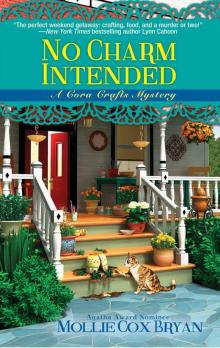 No Charm Intended
No Charm Intended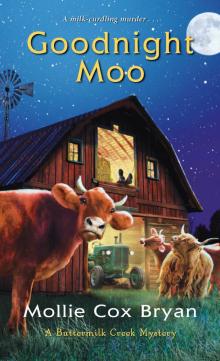 Goodnight Moo
Goodnight Moo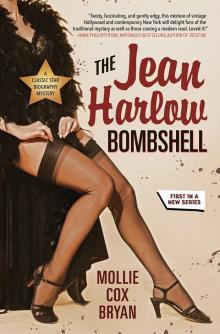 The Jean Harlow Bombshell
The Jean Harlow Bombshell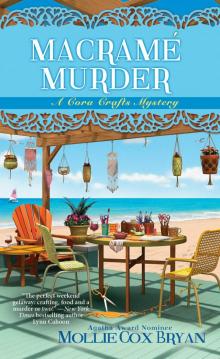 Macramé Murder
Macramé Murder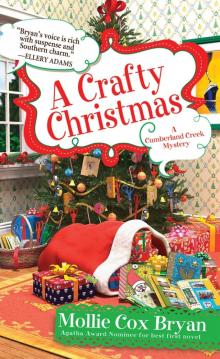 A Crafty Christmas
A Crafty Christmas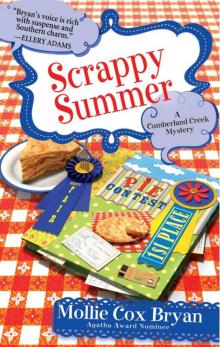 Scrappy Summer
Scrappy Summer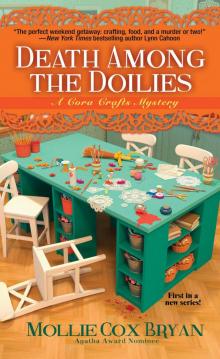 Death Among the Doilies
Death Among the Doilies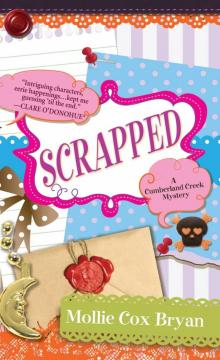 Scrapped
Scrapped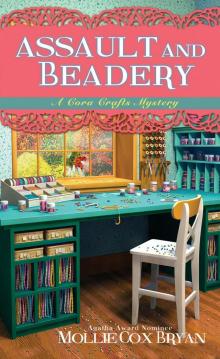 Assault and Beadery
Assault and Beadery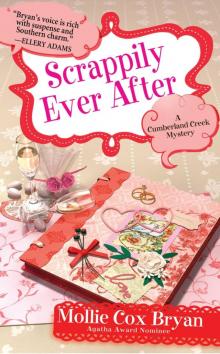 Scrappily Ever After
Scrappily Ever After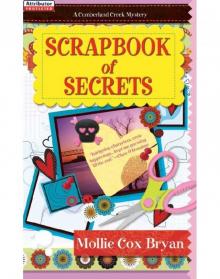 Scrapbook of Secrets
Scrapbook of Secrets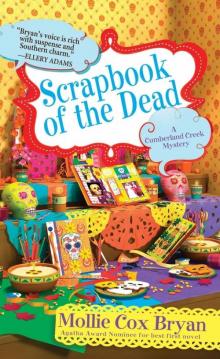 Scrapbook of the Dead
Scrapbook of the Dead